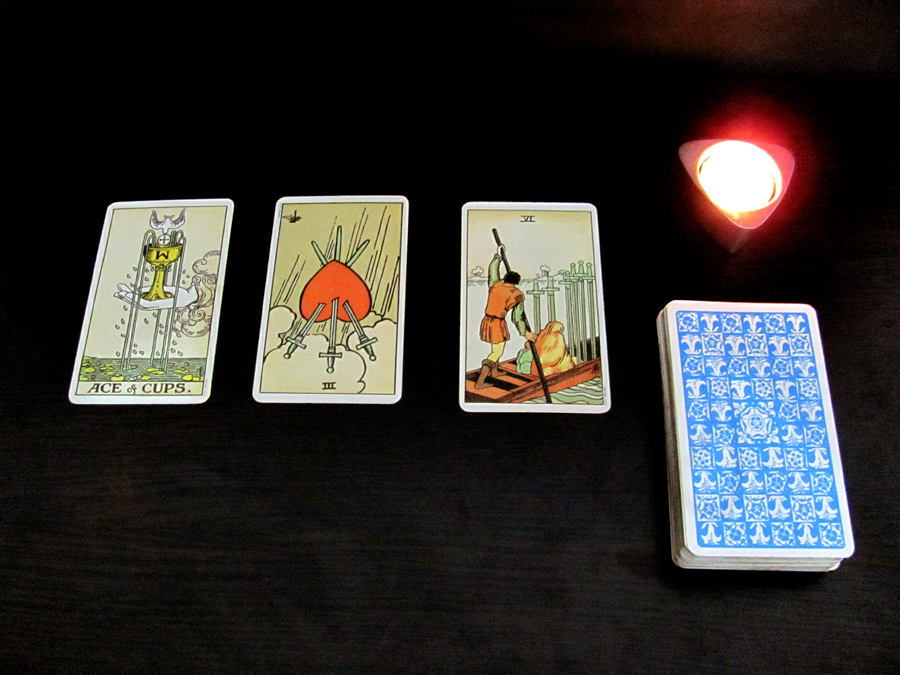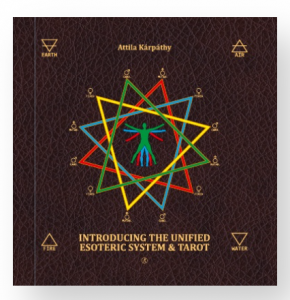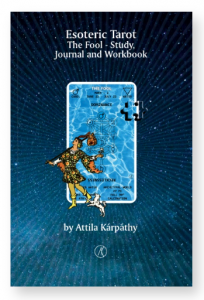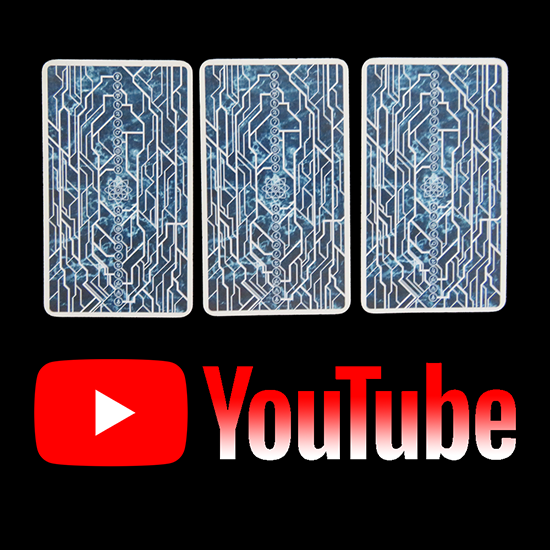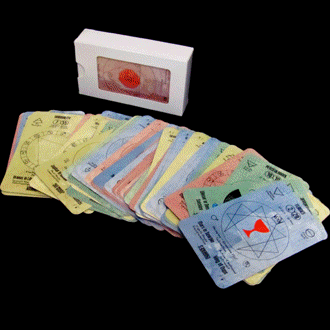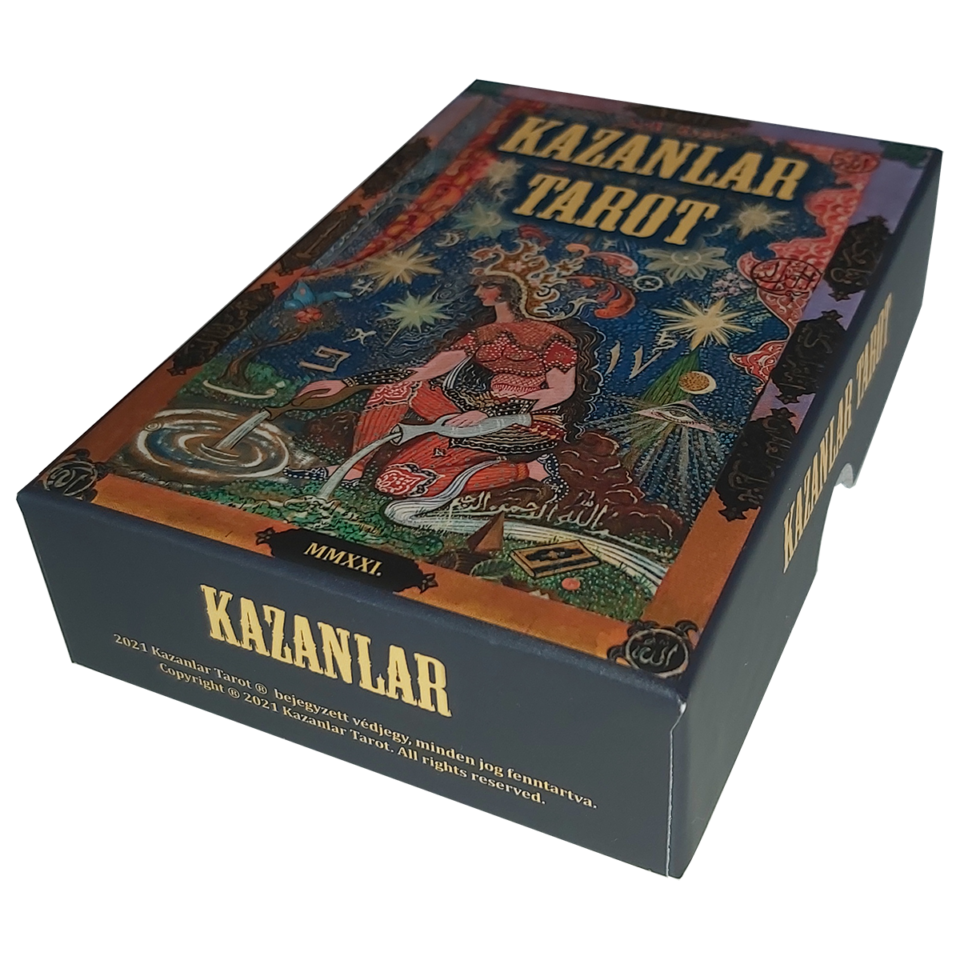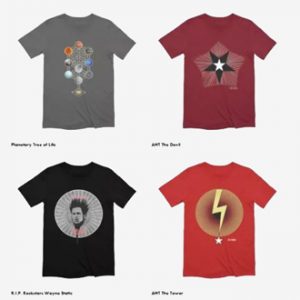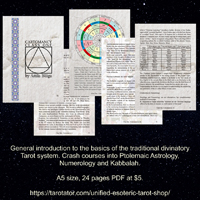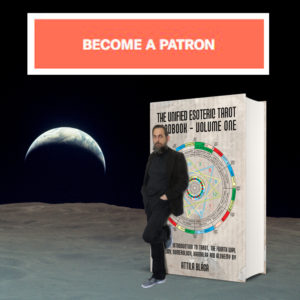‘No such thing as luck’ or what is a Tarot reading
Hardcore fans of Science generally are quite skeptical about fortune telling and especially about Tarot cards. They seem to ignore the fact that Physics is about predicting the future. As a consequence we should consider Physics a kind of Magic or charlatanism? Obviously this is not the case. While Science needs a data set to make predictions, Tarot works in a mysterious, not yet identified way. While in Science the quantity of data it’s crucial and the lack of data or more data can alter or completely change the result of a prediction, in Tarot all we need is the 78 Tarot cards which incorporates all the available data (information) from the Universe.
We can calculate precisely the distance between two people if we have the right amount of data, but by no scientific mean we can measure or calculate how close those two people are emotionally or spiritually. While lacking sufficient data the science fails to make accurate predictions, by using the Tarot cards we can foresee the future quite precisely. But in order to do that we must understand how people and the Universe works.
Generally, most people decide to consult a Tarot reading in hope that by doing so they would find a solution to a problem they have. That’s what they are paying for – at least that’s what they believe. And – unfortunately – there are lots of charlatans who take advantage of the desperate or the naïve. The Tarot does not solve any problem, the Tarot will show a possible outcome of the problem using the current information. Sometimes the Tarot reader may advice the client to make some changes in order to bring about a different outcome. Though it is up to the client exclusively to make or not those changes most people are simply waiting for “miracles” or hoping that somebody else will do the hard lifting instead of themselves.
We should bear in mind also that nobody lives in total isolation. We’re interacting with each other and our lives are interfering. Sometimes the decisions of other people will affect us. It is not something bad, it is not something good, but it is simply how it is, how the Universe works, respectively, how things work in our society, society which is part of the Universe.
In this light there are two philosophical elements which we should consider: destiny or fate respectively predestination, and free will – as opposites.
Destiny or fate means a predetermined course of events. Fate is often conceived as being divinely inspired. The idea of a god-controlled destiny plays an important role in several religions such as Christianity and Islam.
F. Furman Kearley, in his article “The Biblical Doctrine of Predestination, Foreordination, and election” explain that: “(John) Calvin defined predestination as the eternal decree of God by which He decided before the foundation of the world what is to become of each and every individual.” On the other hand, Afroz Ali wrote in his book: “In Islam, “predestination” as a reality constitutes one of the six Principles of Faith.”
It is not only Religion that would have you believe in fate. For instance, Fatalism sees events fixed by fate are unchangeable by any type of human agency. In other words, humans can have no effects upon their own destiny. According to this concept, fate is something strict and unchangeable. Some scientists also embrace this hypothesis of predestination or preprogrammed existence.
The concept of predestination could be quite a comfortable conclusion, to support the possibility of foreseeing the future. While everything is “decided before the foundation of the world”, it is also possible to peak into that fixed and rigid future using the Tarot cards (or any other method for that matter). But if everything it’s established right from the beginning or even before we were born, what’s the use to get up from the bed each morning and do anything at all? What is the meaning and purpose of life if man cannot control by any mean his own destiny?
The opposite is the belief in free will. Man is in total control of his destiny and he is solely responsible for his actions. Perhaps the three most important concepts in philosophical works on free will are: free will, moral responsibility, and determinism. In the philosophical literature, libertarianism is the view that we have free will and that free will is incompatible with determinism. Free will is the actual ability to choose, in a fully autonomous manner one’s actions.
Finally, somewhere in the middle there are people who believe in the combination of predestination with free will. How much there is fate and how much there is free will in ones life depends on one’s individual belief and this is still the subject of many debates. But the bottom line is, replacing God with Reason makes no difference simply because neither Religion, nor Science have an indisputable answer to all these questions right now.
From my consistent practical experience I only can say that the Tarot cards reveal a possible future, or possible options we have and some things might be changed by our decisions and actions. There is no such thing as luck, life most likely is a complex “game” of opportunities and decisions.
Reading the Tarot cards is an efficient way to take decisions by accessing some information which is not accessible by any other means at this time. Astrology, Numerology and the Tarot hold answers in matters where Science is still powerless. Mathematics, Physics or Medicine can solve the problems of the material, visible world, but have no bearing on spiritual and emotional matters because the can’t (and do not) handle the aspects of the invisible world. Although some hardcore fans of Science may argue that everything its material and there is nothing spiritual in this world, this debate it’s very old and has not yet been resolved. While Plato believed in both, a material and a spiritual aspect of the world, Democritus, considered the “father of modern science” and is credited with the famous saying: “Nothing exists except atoms and empty space; everything else is opinion.” However there are no mathematical or mechanical explanations and solutions for emotional and spiritual issues. It is quite an important ‘detail’ to understand that the world is not made of two components, material and spiritual, but of three, material, emotional and spiritual – as we will see.
Hence, there is one other concept which needs clarifying here: the Karma.
Some might mistake karma for predestination. For every action you take there will be a reaction to it in the future. This is, in a nutshell, the Law of Karma.
For every action we take, we will face a reaction in the future, which could be a few seconds away, fifteen years away or in the next incarnation. The universal law of causation is called in Sanskrit the Law of Karma. Any action, physical or mental is called Karma; and as every action is bound to produce its reaction or result it is also Karma. At the same time, and secondary to any action there is a cause and an effect – in the word Karma the cause and the effect are included.
The Law of Karma expresses the same principle as the Sixth Hermetic Principle also called the Law of Cause and Effect: “Every Cause has its Effect; every Effect has its Cause; everything happens according to Law; Chance is but a name for Law not recognised; there are many planes of causation, but nothing escapes the Law.”
According to Swami Abhedanandac, author of the book ‘Doctrine of Karma’, the concept of Karma includes several – Universal – Laws: the Law of Causation, the Law of Action and Reaction and the Law of Compensation, respectively the Law of Retribution. All these Laws of Karma work together.
The Law of Cause and Effect is the most universal of all law. Under the sway of the Law of Karma, there is no room left for a chance or accident. The ‘Law of causation’ represents the Law of Action and Reaction. Every action brings its own reward or punishment.
Karma also means that our present character is determined by the past, respectively by our past behaviour and our own choices in the previous existence. It is our own Karma that produces joy or sorrow, pleasure or pain and neither God nor Satan is responsible for our pleasure or pain. Reward and punishment given by God are nothing but a reaction of our own mental and physical actions; in fact, God never rewards the virtuous nor punishes the wicked. Every good act brings its own reward by the law of compensation, while evil act brings its own punishment by the law of retribution.
Karma excludes the idea of predestination and make ‘man’ responsible for his own decisions and actions. This is something uncomfortable for most people, since as human beings we often prefer to externalise and shift the responsibility for our actions (and failures) to a super-being called God, and simply blame ‘bad luck’ or ‘misfortune’.
The Karmic perspective it’s quite proper for the Tarot since the cards reveals a possible future according to our past choices, our present approach on the subject; but the future is changeable by the choices we’ll make and our future actions. The very purpose of reading the Tarot cards is to map the future based on our past decisions, current course of action in order to see the possible outcomes. Also, this opens the possibility to make different choices, take different actions and by that we may change the outcome – the future; to benefit us.
Practically, the simplest Tarot reading is made with three cards. The first card represents the present, the second card represents the past which lead to the current situation – which is the cause – and the third card represent the outcome, the future – which is the effect. Which is the representation of the very essence of the concept of Karma.
Excerpt from the book ‘The Tarot and the Jacob’s Ladder’ by Attila Blaga. Full or partial use of this text for commercial or non-commercial distribution by any means whatsoever is strictly prohibited unless expressly authorised by the author.

